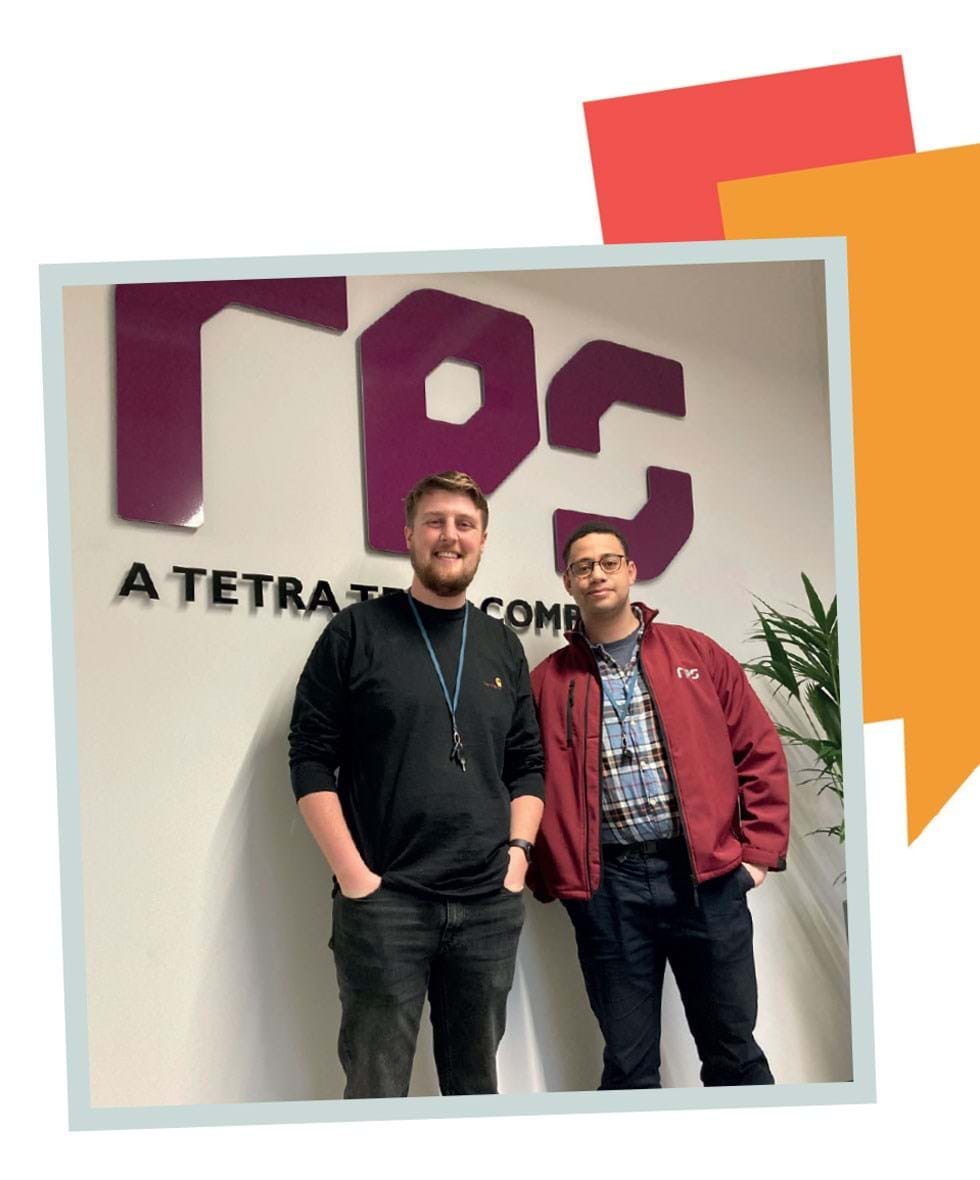What we have Learned from our Mentor/Mentee Journey

Chemical engineering graduates Rory Foster and mentee Fred Barrett share insights into their mentorship journey at RPS Consulting Services, where new graduates are paired with experienced mentors to support career development and chartership goals
RORY FOSTER (MENTOR)
Why did you become a mentor?
As a process safety consultant, I volunteered for the mentorship scheme to develop my interpersonal and leadership skills. It has also allowed me to strengthen my knowledge through assisting my mentee in his learning. This in turn has allowed me to build confidence in myself and the lessons I have undergone during my own initial development through the company graduate scheme.
During my initial development at RPS, my line manager was very helpful, guiding me through the beginning of my career However, I would have appreciated being able to communicate my ideas and queries about the working environment with someone who had experienced what I was going through more recently.
What techniques are useful for mentorship?
Active listening
Using active listening – paying full attention to what Fred is saying without interruption or judgement – allows me to understand his challenges, aspirations, and concerns. Asking Fred open-ended questions, meanwhile, encourages him to express himself and clarify what he needs. Due to the scope of our roles, Fred and I are away from the office quite regularly on client sites or working from home on differing schedules. Therefore, when we are both in the office, I try to have discussions regularly to find out how he has been, what he has been getting up to, both in and out of work, and if there is anything he needs assistance on. I believe that meetings – whether mentor or client – work best face to face as being able to read someone’s body language and general demeanour allows me to understand them better and in turn improves my guidance or feedback.
Provide constructive feedback
When providing critical feedback, I try to frame it in a positive, supportive way to encourage improvement. This is key as we have all been at the beginning of our careers and made (and continue to make) mistakes. Providing feedback is a critical aspect of our working roles. My first opportunity to provide feedback to Fred was on a Hazard and Operability (HAZOP) report that he assisted in scribing. During a one-to-one meeting we discussed the report and I commented on both the positives and negatives while providing clear examples from previous projects of how to improve the report. Therefore, the next time I checked one of his reports, while there were still errors (as expected – nobody’s perfect!), some of the issues from the first report were removed and it was a more complete report.
Be a role model
I have tried to set an example of how to operate within RPS to Fred, showing him the techniques and skills that enabled me to successfully navigate the graduate scheme. This includes trying to instil an inquisitive nature by not being afraid to ask questions and always being open to new opportunities, such as asking for work from different team members. Team members can assume that you are busy if you are not asking for work. Therefore, I always try my best to ask my senior colleagues if they have any tasks I can do (proposals and project admin are a great way to get into the mind of a project manager when the next work scheme comes around). This is especially important when working from home, as it is easier to be forgotten when not seen.
Early in your career it also allows you to find tasks and areas of particular interest and where your strengths and weaknesses lie, making you a greater asset to your team.
Provide resources
Sharing resources is a key part of being a mentor, especially coming into a company from university where the standard and style of the documents you are writing can be very different. Before Fred started his first major project I talked through him some HAZOP reports I had compiled. I gave him the generic report templates that we use within RPS as well as some further reading to provide a deeper knowledge into the subject and the style of document he would be compiling.
Encourage independence
Encouraging independence ties together the previous points quite nicely. By demonstrating the correct way to operate in the workplace, you hope to help your mentee develop the skills needed to succeed independently within the company and the broader engineering community. A great way to start this process comes through feedback. For example, not telling Fred the answer to a mistake but by pointing him in the right direction with the HAZOP report it allowed him to learn from those mistakes and progress.
Conclusion
It has been great getting to know Fred and to see him grow into the role. We have consistently met up to discuss work and our personal lives. This period has been a great benefit to me as I have been able to consolidate my own knowledge when giving feedback on Fred’s work. It is sometimes difficult not to make changes to Fred’s work myself as it might be quicker. However, in order to develop, Fred needs to be able to see mistakes and potential errors himself and learn what he needs to do to get to the level required, just as my seniors did with me during my development.
When providing critical feedback, I try to frame it in a positive, supportive way to encourage improvement. This is key as we have all been at the beginning of our careers and made (and continue to make) mistakes

FRED BARRETT (MENTEE)
What were your expectations as a mentee?
I joined RPS as a graduate consultant in September 2024 and am currently progressing within the two-year graduate scheme. I was aware that there was a mentorship programme and going into the process my expectations were that I would be able to talk to my mentor about any issues or difficulties that I may experience as part of my new role. I had not had a mentor in previous work and so I was interested in engaging with the process actively. Having met Rory informally at the RPS summer social before I began my new role, I was confident that we would get on.
What are your responsibilities as a mentee?
As a mentee, one of my main responsibilities is my personal development. This includes both my formal career development as well as the improvement of my technical and soft skills. This then ties in with my responsibility to actively engage with the mentorship process by scheduling meetings with Rory and setting out agendas that align with what I want to achieve. I began to schedule these meetings a few months into my new role, once I felt more comfortable with taking ownership of the mentoring process. For these face-to-face meetings, I prepare an agenda that details the specific aim of the meeting. This could include discussing a specific item of work that I have done recently or could be more general discussion on my current workload and activities. While the meetings are informal, I prefer to use an agenda to ensure our meetings are productive.
Additionally, a structured approach allows me to use tools such as Kolb’s Learning Cycle to monitor my progress and revisit our previous meetings to discuss my approach. By actively delivering on my responsibilities as a mentee, I feel more involved with the mentorship scheme as Rory and I work together to improve my skills and abilities.
What are the benefits?
One key benefit is how well the mentorship scheme fits into the overall RPS graduate scheme. Since Rory has recently completed the scheme, he has insights on the various monthly training workshops that I have been attending. This enhances the benefit of these workshops as I can compare our experiences and discuss with Rory what he considers to be the most important lessons from these workshops. As well as this, by speaking to Rory I can understand better how these training workshops improve my ability to do my job as Rory has implemented multiple lessons into his own work and I can see how that’s coming along.
Another benefit is that having Rory as my mentor has helped to improve my technical skills. Rory has given me numerous tips and workflow suggestions for the various software packages that we use at work, including the Office suite as well as software such as PHAST and QGIS. This builds on the formal training that I have received at RPS and allows me to complete my work to a higher level at a faster rate. Rory’s involvement has therefore been instrumental in how I approach technical challenges at work by reducing the time required to complete my tasks.
A more general benefit is that I also have a role model within RPS. Rory and I both have chemical engineering degrees, and both joined RPS as new grads. Being able to see and ask Rory about his career journey and progression is very useful for me for planning my own and being prepared for upcoming challenges and opportunities.
Being able to see and ask Rory about his career journey and progression is very useful for me for planning my own and being prepared for upcoming challenges and opportunities
How has it helped you?
As a graduate consultant, I am keen to enhance my project management abilities, deepen my industrial knowledge, and improve my interpersonal skills with clients. Rory has been instrumental in improving my overall confidence and skills, leaving me able to progress with these personal career goals. By actively engaging with the mentorship programme, I have received useful resources and training in technical skills as well as developing my own independence. As Rory has recently been in my position, he is aware of my current challenges, aspirations, and concerns. Having a mentor allows me to talk through issues that I am struggling with that are relatively minor but affect my confidence. Rory’s support has allowed me to feel empowered within RPS.
What could be done better?
While I am pleased with my experience within the mentorship scheme, I do have some advice for future mentees to best prepare for and make the most of the experience. I would suggest that future mentees take ownership of the process as soon as possible, scheduling meeting with their mentors to go over both parties’ aims and expectations. I know that I would have benefited from arranging meetings earlier than I did as I would have had a framework to judge my performance in my first month at RPS.
Conclusion
Overall, my experiences at RPS have been significantly improved as a result of having a mentor. Knowing that Rory is invested in my growth and success has been incredibly motivating and has encouraged me to take on new challenges with enthusiasm. I would happily suggest that others in my position either seek out a mentor if they do not have one or if they do, that they engage actively with them.
We hope you have found this guidance useful. If you are an undergraduate or recent graduate and want to boost your network, join the IChemE National Early Careers Group (https://www.icheme.org/necg) and contact our committee members.
Recent Editions
Catch up on the latest news, views and jobs from The Chemical Engineer. Below are the four latest issues. View a wider selection of the archive from within the Magazine section of this site.




